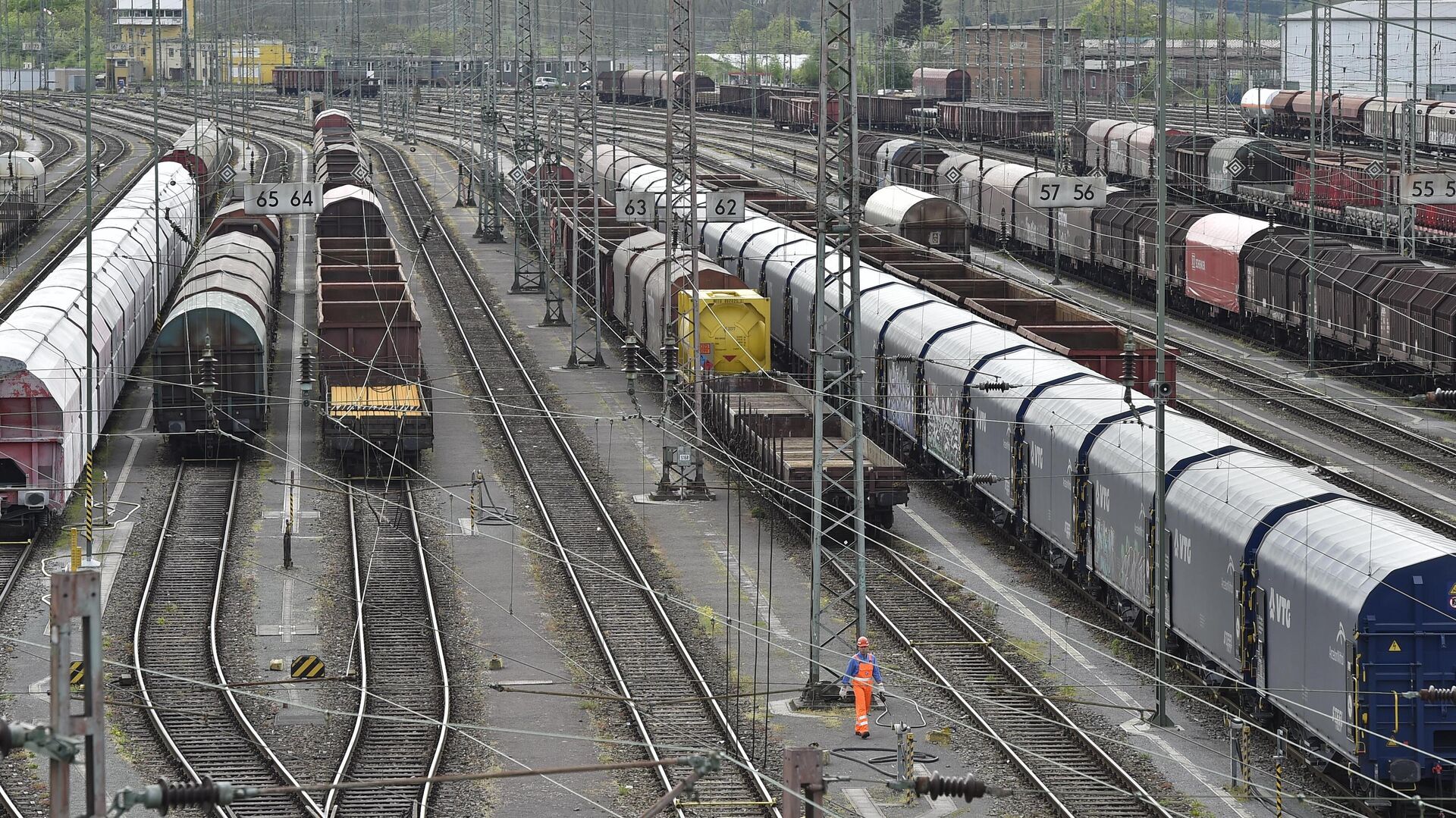https://sputnikglobe.com/20230524/german-chamber-of-commerce-forecasts-0-economic-growth-for-2023-1110567214.html
German Chamber of Commerce Forecasts 0% Economic Growth for 2023
German Chamber of Commerce Forecasts 0% Economic Growth for 2023
Sputnik International
In a dismal economic report, the Association of German Chambers of Industry and Commerce (DIHK) forecasted that the economy would flatline this year, despite the general optimism expressed by business owners in a recent survey.
2023-05-24T17:53+0000
2023-05-24T17:53+0000
2023-05-24T17:53+0000
world
germany
german chambers of commerce and industry (dihk)
gdp growth
https://cdn1.img.sputnikglobe.com/img/07e7/03/0b/1108288253_256:0:3897:2048_1920x0_80_0_0_24a4165c08aba0bf9519a0d751b891bf.jpg
In a dismal economic report published earlier this week, the Association of German Chambers of Industry and Commerce (DIHK) forecasted that the German economy would flatline this year, despite the general optimism expressed by business owners in a recent survey.The chamber of commerce assessed a 0% growth in gross domestic product (GDP) for 2023, with board member Ilja Nothnagel telling reporters that "signs of a broad-based upswing continue to be missing."The German economy has sputtered to a halt amid high inflation, high energy costs driven upward by the Western boycott of Russian energy exports, and higher raw material costs due a number of factors characteristic of the COVID-19 pandemic. In addition, labor costs remain high due to a shortage of skilled workers, leading the DIHK to suggest that Berlin loosen its immigration requirements.Alongside the forecast, the DIHK published the results of a survey of 21,000 German companies that were asked about a number of business-related issues.Of those surveyed, 34% rated their situation as good, while 51% described it as satisfactory and 15% said their situation was poor - numbers essentially unchanged from the previous survey in January.Of those surveyed, roughly two-thirds identified the prices of energy and raw materials as the greatest risk to their business performance - down from 72% in January.On labor, 62% said the labor market shortage was affecting them, and 53% cited high labor costs as a business risk, which was up from 49% in January.
https://sputnikglobe.com/20230411/ukraine-conflict-takes-attention-away-from-other-things-that-matter-more---imf-chief-1109369989.html
germany
Sputnik International
feedback@sputniknews.com
+74956456601
MIA „Rossiya Segodnya“
2023
News
en_EN
Sputnik International
feedback@sputniknews.com
+74956456601
MIA „Rossiya Segodnya“
Sputnik International
feedback@sputniknews.com
+74956456601
MIA „Rossiya Segodnya“
dihk; germany; gdp; economic growth, who suffered most from anti-russian sanctions
dihk; germany; gdp; economic growth, who suffered most from anti-russian sanctions
German Chamber of Commerce Forecasts 0% Economic Growth for 2023
Berlin was one of the more hesitant NATO members about pushing Ukraine into a military confrontation with Russia in early 2022, as it looked to open the long-awaited Nord Stream II gas pipeline - something long opposed by Washington. The pipeline was closed after Russia’s special operation began, and it was later bombed by saboteurs.
In a dismal economic report published earlier this week, the Association of German Chambers of Industry and Commerce (DIHK) forecasted that the German economy would flatline this year, despite the general optimism expressed by business owners in a recent survey.
The chamber of commerce assessed a 0% growth in gross domestic product (GDP) for 2023, with board member Ilja Nothnagel telling reporters that "signs of a broad-based upswing continue to be missing."
"The global economy and domestic demand are unfortunately failing to provide any impetus at the moment," Nothnagel said, adding that the German economy urgently needs "new impetus for private investment, but also for infrastructure development.”
The German economy has sputtered to a halt amid high inflation, high energy costs driven upward by the Western boycott of Russian energy exports, and higher raw material costs due a number of factors characteristic of the COVID-19 pandemic. In addition, labor costs remain high due to a shortage of skilled workers, leading the DIHK to suggest that Berlin loosen its immigration requirements.
A skilled worker shortage has long been a problem for Germany, which overhauled its immigration system in 2005 in an attempt to alleviate the problem, with further liberalization changes in the years since. As of 2019, around 13.7 million people living in Germany are first-generation immigrants, or about 17% of the population.
Alongside the forecast, the DIHK published the results of a survey of 21,000 German companies that were asked about a number of business-related issues.
Of those surveyed, 34% rated their situation as good, while 51% described it as satisfactory and 15% said their situation was poor - numbers essentially unchanged from the previous survey in January.
About one-quarter said they expected their situation to worsen over the next 12 months, which was actually a decline from the 30% who said so at the start of the year. Two-thirds said they expected no change at all, while 18% said they expected an improvement of conditions.
Of those surveyed, roughly two-thirds identified the prices of energy and raw materials as the greatest risk to their business performance - down from 72% in January.
On labor, 62% said the labor market shortage was affecting them, and 53% cited high labor costs as a business risk, which was up from 49% in January.



